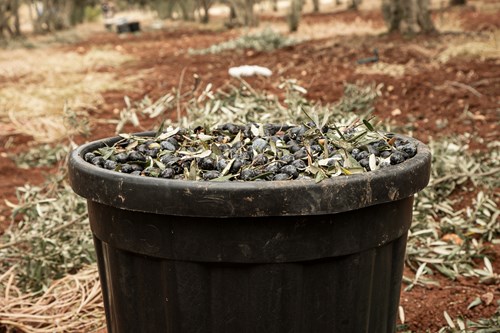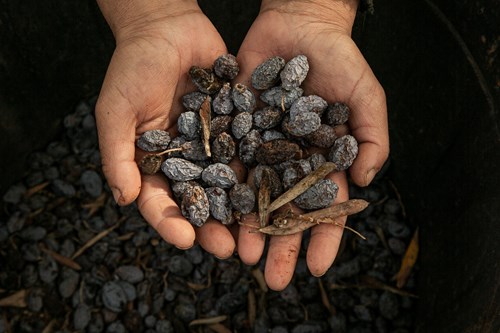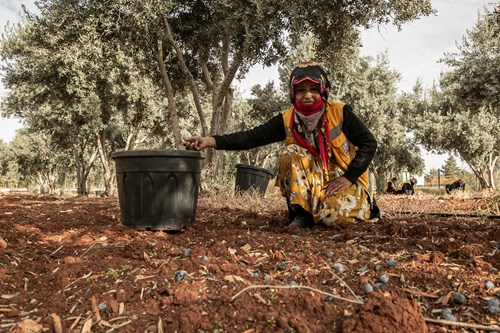In the Fields, Outside of their Comfort Zone
Two disasters hit Şanlıurfa, Türkiye: the earthquakes and floods. Solutions were needed for the people in vulnerable situations who were struggling to find jobs after many businesses were shut down.

The female participants in Cash for Work are collecting olives in a farm run by Şanlıurfa Metropolitan Municipality. The project included different fields, including agriculture.
A day in the field
It was the first day of December, one of the coldest months in Türkiye. The sun hid behind the clouds, leaving a gray filter over a small olive grove in Şanlıurfa, while a group of women happily chatted and laughed together while collecting the olives.

Emine is working as a farmer in Cash for Work Project to gain more experience and become more able to find a job.
Two disasters shaking the province
The earthquake and the floods that hit Şanlıurfa early this year left so much damage. Many people lost their homes and sources of income while some infrastructures needed to be fixed. There was a lot for the local authorities to work on. To support the Şanlıurfa Metropolitan Municipality, the Danish Refugee Council (DRC) started implementing a Cash for Work program, which provides short-term jobs for earthquake or flood-impacted populations from both refugee and host communities. So far, 252 people have been employed under this project, including 93 women.

A participant is collecting olives from the ground.
Challenges
Şanlıurfa is well-known to be one of the most important agricultural provinces in Türkiye. Yet, it has one of the lowest rates of female labor force participation in the country. “People working in farms have to travel for long distances,” says Abdulkarim, the agricultural team supervisor. “Due to the traditions here and the responsibilities women have at their homes, it is challenging for them to get jobs.”
The olive groves were located near those women’s homes, which encouraged them to work as most of them needed jobs. Intizar and Nermin are both from Syria and their husbands, both injured because of the war there, have struggled to find suitable jobs for their health conditions. The situation became more challenging after the February earthquakes as many businesses either shut down or refrained from employing new people.

Females from host and refugee communities are working in an olive farm as part of Cash for Work Project. Usually, farmers shake olive trees, then collect the crops from the ground.
This job came at the right time. The inflation that followed the disasters has caused us a great burden. We had to focus on rent and food and ignore other needs. I feel relieved that I can be available physically and financially for my family.
Nermin, a Syrian participant in Cash for Work
A temporary solution
Intizar joined the conversation. Without any income prior to this project, she was worried about winter because she could not afford to buy wood for heating. Even though she had managed to work some daily jobs, the payment was too little to cover the family’s needs. This went on until she enrolled in the DRC project.

.
I am relieved. This job is temporary but it provides an adequate solution for now.
Intizar, a Syrian participant in Cash for Work
Empowering women
Working in nature makes time fly. The project is going to end soon, but most of them are not worried. Emine is a Turkish woman with younger siblings, whose father is sick, and she is the sole breadwinner of the family. She had had very little experience in the job market prior to this experience, so she did not feel she had a competitive advantage to get a job.

Olives are considered among the most important crops in Türkiye, especially in agricultural provinces such as Şanlıurfa.
This experience increased my self-confidence. I know now that I can rely on myself to look for another, more permanent job.
Emine, a Turkish participant of Cash for Work
Born again
On the other hand, Nermin feels a bit concerned about the future, but she is not worried.
I feel proud of myself. This job helped me leave my comfort zone and get engaged in the labour market. I feel I am born again because I am contributing to my family and my community.
Nermin, a Syrian beneficiary in Cash for Work Project






Hopes and efforts are needed
The sky was clear again and the sun began to shine. It was time for those women to go back to work. Meanwhile, countless other capable women remain unemployed despite their best efforts. More effort should be invested in ensuring those women are fully integrated into a labor market that makes good use of, and amplifies, their capabilities.
* This project was funded by United Nations High Commissioner for Refugees (UNHCR).